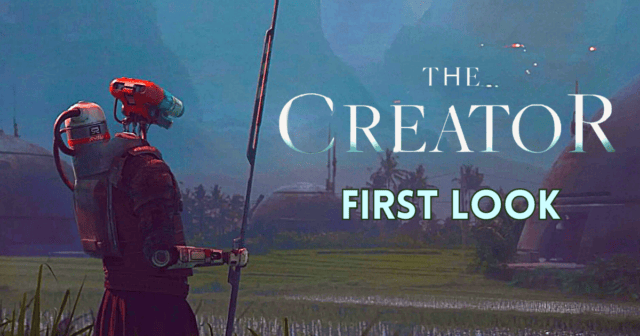‘The Creator’ Review: A Perfect Audio-visual Experience With An Imperfect Story
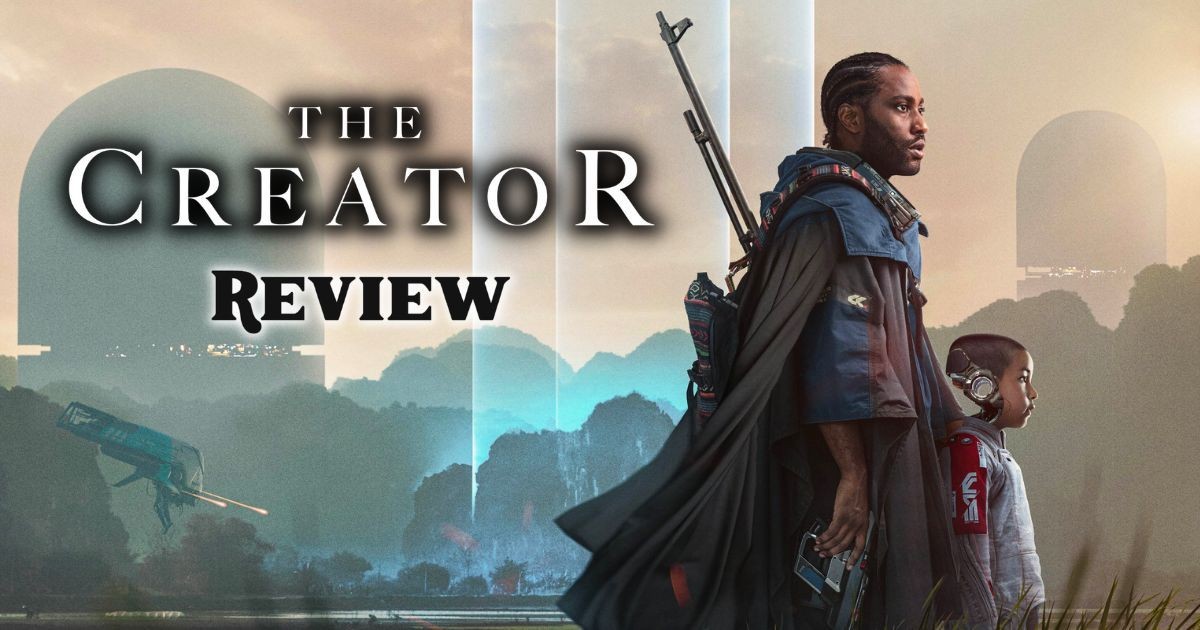
Approaching a Fall/Winter movie season full of promising films, one has stuck out a surprising outlier: Gareth Edwards’ The Creator. The filmmaker burst onto the scene with his debut Monsters, displaying comfortability in playing with human perspective against large-scale threats. He then parlayed that into 2014’s excellent Godzilla, which then catapulted him into 2016’s divisive Rogue One: A Star Wars Story. Despite that film’s solid critical reception and outstanding box office performance, it’s been very clear over the years that the film was creatively compromised in a few key ways.
Edwards bid his time, staging a comeback of sorts in his new original science-fiction. The trailers for The Creator, backed by “Dream On” by Aerosmith and previewing some truly impressive imagery, have certainly turned heads. There’s no question about it, as a whole The Creator is an impressive work. Made for only $80 million, the money on screen feels bottomless.
Gareth Edwards brings to life a fresh science-fiction universe built on the strong bones of its predecessors, bolstered by a bleak war picture tone that puts it in a league of its own. Outside of its formal excellence and strongly committed performances, The Creator doesn’t always stick to the landing when it comes to communicating its core themes. Does the immersive experience The Creator provides outweigh its uneven storytelling? Find out what I thought below.
[Warning: Early impressions and mild spoilers for The Creator are discussed below!]
A new (but familiar) world in The Creator
In the future, the world is dominated by two major superpowers: the United States and what’s referred to as the New Republic of Asia. They’re locked in a never-ending war over the propagation of AI, or artificial intelligence. Whereas New Asia embraces AI, allowing artificial citizens, or “Simulants”, to live amongst them, the U.S. opts to exterminate the simulant threat by any means necessary.
Word comes down to the chain of command that New Asia has a weapon that could potentially end the war at the cost of humanity. The United States government enlists former Special Forces agent Joshua (John David Washington), who was once embedded in a Simulant camp run by Harun (Ken Watanabe) to find the weapon and its creator. As it turns out, the weapon is a Simulant child Alpha (Madeleine Yuna Voyles), or Alphie for short, first of her kind, who he must protect in order to find this elusive creator.
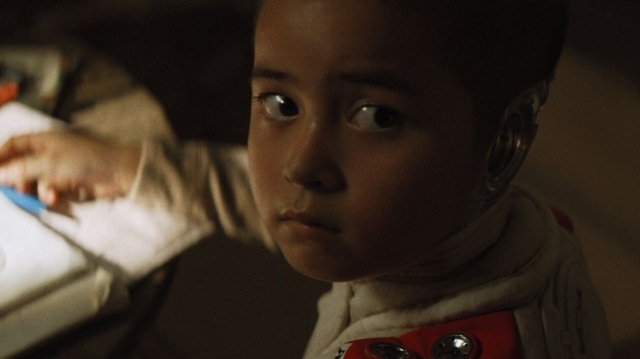
As an audiovisual experience, The Creator soars beyond reproach. Shot on the relatively inexpensive Sony FX3 camera across 80 locations in an ultra-wide aspect ratio of 2.76:1 by cinematographers Greg Fraser and Oren Soffer, the world of The Creator is tangible. Writers often draw upon that word to describe lived-in science-fiction universes, but what this film accomplishes is truly game-changing.
A heavy use of natural light and very purposeful composition leads to images that might as well be beamed in from our future. It beats even the likes of its core inspiration Blade Runner in conjuring up a vision of what a more technologically-enhanced version of our civilization might look like.
The Creator’s visual effects work is also quite seamless. The design of the Simulants, with a cavity in the back of their heads you can see directly through, looks like you could stick your finger in and touch it. Really, both the more advanced “human-like” Simulants and the fully robotic ones with no human features come off as inspired science-fiction creations of the same grungy variety of the work of Neill Blomkamp (District 9, Elysium).
Even the human characters, specifically Joshua, are enhanced with robotic limbs that one doesn’t even bat an eye at. They’re that real. Moreover, the weapons in the film come across like a mix of modern-day weaponry and the pulse rifles from the likes of Halo.
Bleakness as a virtue
Easily the most immediately striking image is that of the U.S. military space station Nomad. Something akin to a sting ray emitting bright blue beams from the bottom, it’s an omnipresent image of imperialism that creates a wonderfully unsettling feeling. That bleak, overbearing imperialist visual adds to a bleak tone that really sets The Creator apart from the pack.
This manifests itself in a highly unusual protagonist in John David Washington’s Joshua. A good soldier, haunted by his betrayal of Simulant-sympathizer wife Maya (Gemma Chan), Joshua simply “carries out orders” without asking questions. His higher-ups, the ruthless Colonel Howell (Allison Janney) and dead-eyed General Andrews (Ralph Ineson) drive the callous nature of the military-industrial complex home.
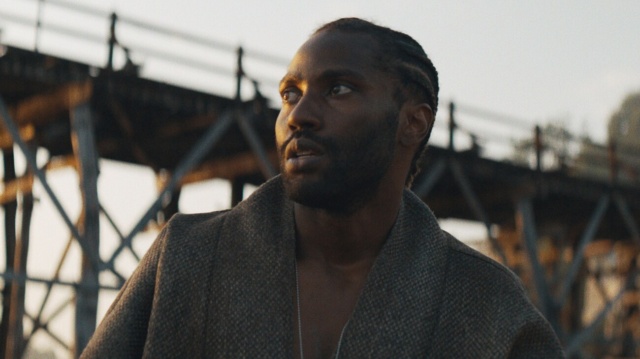
One scene that carries a peculiarly eerie quality is when Joshua arrives in New Asia. To the tune of Radiohead’s “Everything In Its Right Place”, he looks out at the scenery- viewing it as an alien world. Here, the influence from Apocalypse Now rears its head, as Joshua prepares to step into the heart of darkness.
The “Lone Wolf & Cub” style narrative does just fine in showing Joshua and Alpha’s burgeoning connection. Unlike most films of this ilk, The Creator opts to tell audiences up front that the artificial intelligence feel, and by most trades, are human. Madeleine Yuna Voyles is the epitome of what a good person, A.I. or not, could be. A symbol of purity that softens a built-up exterior by Joshua over time in a natural way that is played mostly earnestly, saved for a couple of ill-timed bits of humor.
The limits of allegory in this science fiction story
As a rumination of prejudice, The Creator mostly works. A bit of the film involving Joshua reconnecting with an old Special Ops buddy Drew (Sturgill Simpson), who has now become a Simulant-sympathizer, pulls on the heartstrings as it puts the uselessness of conflict first and foremost, as does a rather engaging third act. The problem is that the themes of The Creator, as well as its optics, become muddled. Artificial intelligence is a loaded issue in this day and age, but The Creator doesn’t really want to engage with its implications. Considering composer Hans Zimmer at one point considered doing the score using AI, its place in the world nowadays is something to ponder. Nevertheless, The Creator’s grasp of the concept seems to be limited to thinking machines, or androids.
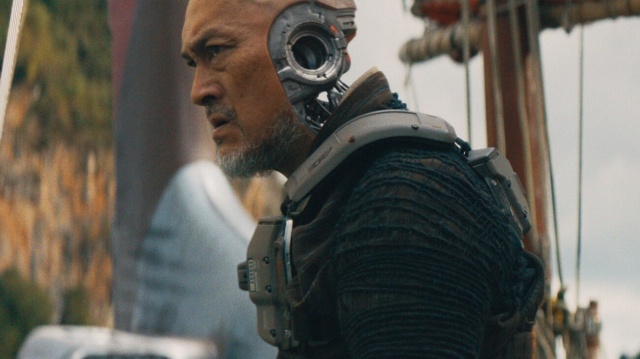
More unnervingly, the choice to make the vast majority of the Simulants Asian-coded comes across as highly uncomfortable. During the film’s intense war scenes, several of these characters are slaughtered in a way that’s supposed to make the audience gasp. It does, only in a way that’s more uncomfortable, and not in a good way, than effective. Apocalypse Now is a clear reference point, so is Gareth Edwards trying to make a parallel to the Vietnam War? In that case, it would seem a gross comparison, as the many people who died were definitively human, and using that kind of imagery as a crutch for relatable stakes in its storytelling doesn’t always sit right.
By taking its allegory for racism/xenophobia to such a real, identifiable place it seems like Gareth Edwards is trying to make some kind of a point about the U.S. military seeing its enemies as inhuman. Ultimately, that’s a fair point to make, but how do AI feel? How is their experience different from the average human? Are they the same as us, or are they a distinct species with their own culture? The Creator is so wrapped up in its admittedly staggering universe to answer these questions or define their AI characters enough to define the conflict more than relying on cheap shock from familiar travesties in world history.
The verdict on Gareth Edwards’ The Creator
The Creator is an imperfect film. It stumbles in its overtly loaded imagery that draws uncomfortably upon real-life tragedy. Nevertheless, the story sings when given the chance to be a story about a man who lost his humanity and then regaining it.
Gareth Edwards forges a bleak, introspective tone only helped by lived-in performances and some of the most engaging visual designs put on screen in a major science-fiction motion picture. Even given its stumbling in certain areas, it’s a major step forward for adult science fiction not tied to pre-existing IP. There’s a sense this is only the beginning for Gareth Edwards, and The Creator, for the most part, is a step in the right direction.
★★★★/ ♥♥♥1/2
The Creator releases in theaters this Friday, September 29, 2023! Are you going to check it out this weekend? Let us know on social media @mycosmiccircus or in The Cosmic Circus Discord.

